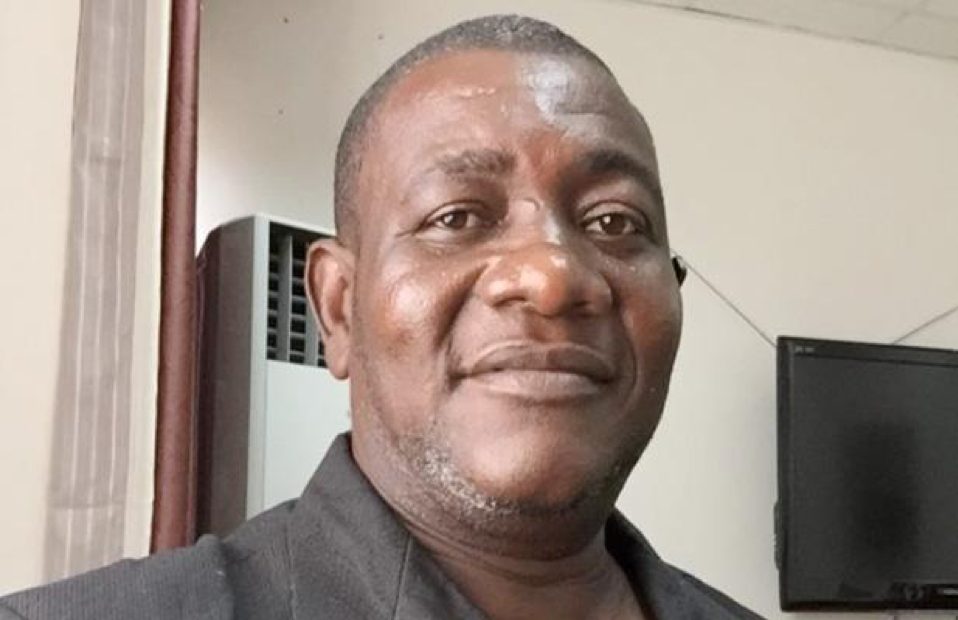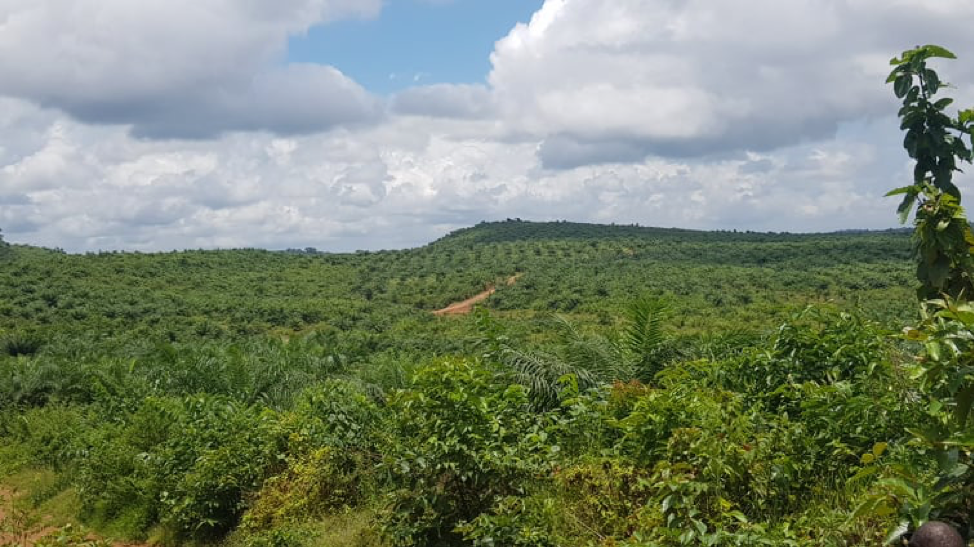Banner Image: A portion of former Senator Armah Jallah’s controversial palm plantation in the Fallah Clan of Bopolu District, Gbarpolu County. The DayLight/James Harding Giahyue
- Former Senator Armah Zolu Jallah claims 850 acres of land he received from the chief of Fallah Clan, his uncle in 2016, for a palm plantation.
- Residents of the clan did not participate in the decision to give Jallah the land. Now they do not have farmland and are farming elsewhere
- Jallah and Domah do not recognize the residents’ collective ownership of the land. They claim the land belongs to their forebears, not the community.
- An individual cannot own a community land under the Land Rights Act but Jallah argues he got the land before the law was passed.
- The story comes amid a series of ‘elite land-grab’ in Liberia, following an array of sweetheart concessions agreements that have pushed the country’s rural poor further into poverty
By James Harding Giahyue
UNDERWEAR TOWN, Gbarpolu County – Armah Zolu Jallah, the former President Pro Tempore of the Liberian Senate, is claiming 850 acres of the land in Fallah Clan, Bopulu District. The palm plantation he has developed on the land is one of the largest farms in Gbarpolu County, employing up to 150 people before the coronavirus pandemic, according to him.
But several townspeople in the area interviewed by The DayLight did not participate in the process through which he got the land. We could not independently verify the size of the plantation and land Jallah is claiming but it covers nearly all of the land around Underwear in the Bopulu District. Villagers are now in search of farmland elsewhere.
“It (Jallah’s palm plantation) affects Ekki Village,” said David Morris, a resident of the Village next to Underwear Town. “People can’t farm there anymore,” Morris said he and other townsmen would resist if Jallah tried to extend his plantation.
Jallah denies any wrongdoing, saying the people in Ekki Village were “squatters.” “They have no right to be where they are,” Jallah, 54, said in a mobile interview with The DayLight.
Alfred Domah, Jallah’s uncle who approved of his possession of the land, said 500 acres of the controversial land belonged to Zulu Siafa, the former senator’s late grandfather after whom he was named, and 350 acres to Miatta Kamara, his late mother.
“Armah Jallah came to me so that he could plant something so that the community can benefit,” Domah told The DayLight, counter-accusing Jallah’s accusers of being “jealous” of his accomplishments. “Where do the Ekki Village people come from? They are who? They just forced themselves there because that’s government land.”
Not just Ekki Village, people in the very Underwear Town were also not part of the process to give Jallah the land. The town was named after its founder, a native of Kpatawee in Bong County who was often seen wearing a singlet, the local legend goes.
“The situation in Underwear Town is getting difficult because of the land the man took to do his farm,” said Joseph Sirleaf, Jr., the town’s youth leader in an interview with The DayLight. He and four other people were at their charcoal site on the remnant of an afforestation plantation owned by the Forestry Development Authority (FDA) across the Barma River.
“They disregard us,” said David Morris, 75, Domah’s neighbor, who said he had lived in the town for 52 years but was excluded from land matters.
Jallah said there was no reason to get the consent of the entire town as his family own the land. “On land issues, we don’t go around talking to everybody,” he said. “The lands in the Underwear area are owned by our fore-parents. If we intend to do something in Underwear Town, we go to them (relatives).”
Samuel Sumo, 52, the husband of the daughter of the man after whom Underwear was named, accused Jallah of bribing Domah with L$10,000, a motorcycle, and roofing sheets. That accusation was also made by Morris, Sileaf, the people in Ekki Village and other people The DayLight interviewed.
Jallah declined to comment on the matter.
Domah denies the accusation. “Anybody tells you that one is a black lie,” the 80-something-year-old Domah said. “If I bring medicine now, [and] they eat [it], tomorrow you will go bury that people.”

Liberia’s Land Rights Act recognizes customary land ownership and mandates land-related decisions meet the consent of the community, including women and the youth (Before it, women in most rural communities were not allowed to discuss or own land). Fallah Clan needs to meet the requirements under the law to carry out land transactions. It has not declared itself a landowning community and does not have a land-governance body.
‘Our Inheritance’
The accusation against Jallah, whose efforts as a senator of Lofa County led to the creation of Gbarpolu in 2001, comes amid a growing number of what campaigners call “elite land-grabs.” A 2019 Sustainable Development Institute (SDI) report found past and current government officials at that time may have stolen 9,000 hectares of land in the neighboring Bomi County. It is an unfortunate tale of a country whose history of concessional land-grab dates as far back as the mid-1920s with Firestone and continues today with companies like Golden Veroleum Liberia.
“Elite land grab is a threat to communities’ land rights, a recipe for land conflicts and source of internal division within communities. It’s facilitated by bribery, power and political influence,” said Nora Bowier a lead campaigner at SDI. “It worsens poverty as it deprives communities of their rights to a fair deal and economic benefits from their land and resources.
“These things undermine the intent of the Land Rights Act.”
But Jallah argues he acquired the controversial land before the legislation and does not necessarily have to act within its confines. “The land there is for us by inheritance,” said Jallah, who was a senator when the Land Rights Act was passed into law. “My mother was given land there, and additional land was given to me there by my grandfather. What you see there precedes what you call Land Rights Act or Land Authority regulations.”
Jallah was right. He first cleared the land in 2016 and made a rice farm. The next year, he started planting the palm and continued up to 2018, the year the law was created. However, the Land Rights Policy, which laid the framework for land reform in Liberia, had been in place since 2013. It recommended, “Decision about customary land will be made at the most local level consistent with sound policy and shared responsibilities between the government, communities and their members.” The policy was meant to curtail a horde of land-related conflicts across the country that spiraled out of control in the early 2000s after 14 years of bloody civil war. It would lead to the Liberia Land Authority and the Act Against Criminal Conveyance of Land and the current land law.
Jallah claims he holds his mother’s deed for the land. Sylvester Jallah, his younger brother, has tribal certificates, seen by The DayLight, for a combined 750 acres of land plus a couple of lots in the same region. But the Land Rights Act addresses titles related to customary land before it became law. It mandates all tribal certificates be vetted and transformed into deeds. a process that has already started, with some deeds already issued, according to Adams Manobah, the chairman of the Land Authority. Moreover, it categorizes lands obtained through aborigine deeds as customary lands.
“In those days when people were advocating for land for rural communities, they used the names of chiefs and elders to sign the deed on behalf of the entire community,” said Alphonso Henries a campaigner with Liberia Reform Movement, which advocates for land rights. “But it doesn’t mean that that chief whose name is on the deed owns the land or his children.”
Gbarpolu is a hub for aborigine land grant deeds that are written in chiefs’ names. The late Paramount Jallah Lone—the former senator’s father—claimed he controlled 790,982 acres of land in Bopolu. The county came under the spotlight in the private use permit (PUP) Scandal of 2012. In the biggest intrigue to hit the forestland sector since the end of the Liberian Civil War, officials of the FDA connived with logging companies, and private landowners to loot Liberian logs. Seven of the 62 PUPs abused in the scam came from Gbarpolu, six of them Bopolu alone, according to a report that year by the then Land Commission. They covered 627,657 hectares of land or 20 percent of the total PUP-affected landmass.
Ali Kaba, a land rights expert and one of the crafters of the Land Rights Act, warns authorities to prevent another countrywide crisis. “In light of the PUP Scandal, I think it is important for the government to formulate regulations addressing land claims (private or otherwise) in customary communities,” Kaba said in an emailed interview. “As demonstrated by the scandal, the lack of clear regulations can lead to land-grabs by elites and the eviction of rural communities.”
The Land Authority is aware of the potential for conflict over community land and will complete the land rights regulations within the next six months, according to Manobah. He said people claiming land from tribal certificates and aborigine deeds like Jallah must have the backing of their communities.
“If the community says they don’t know about it, we can’t force them to say they know about it,” he tells me in a mobile phone interview. “If you have a tribal certificate and you developed portion of the [land that tribal certificate represents]…the area that you developed is a hundred percent for you on grounds that the tribal certificate is good. If it is not good at all, then you don’t have any claim.
“On that ground, we can’t say you have the land. That is when you and the community will have to negotiate.”
Back in Underwear Town, Jallah enjoys the support of the chiefs and elders, while there remains opposition to his possession of the land.
“It is good for a single person to get 850 acres of a clan land because the people are benefiting, said Janga Togba, the town chief of Underwear, who works at the plantation. “At the end of the day, we will benefit.”
“They gave the land to Armah Jallah and don’t have any land to farm on again,” said Alex Roberts, an aggrieved resident of Underwear Town. “We are all looking for an area to make our farms.”
Henry Gboluma contributed to this report.
This story is a part of The DayLight Land-grab Reporting Series.




